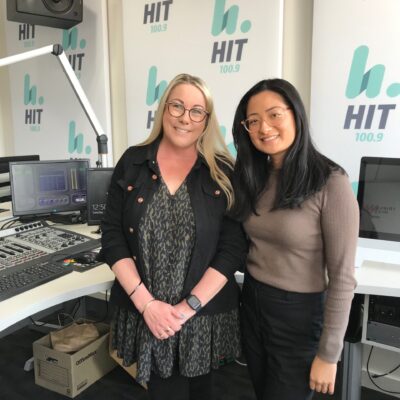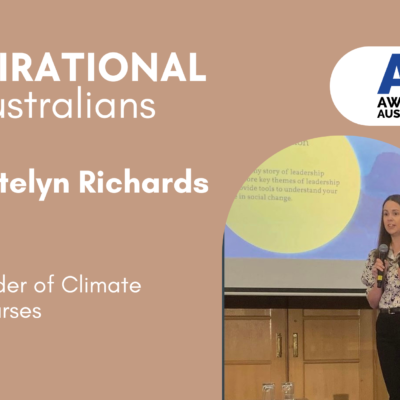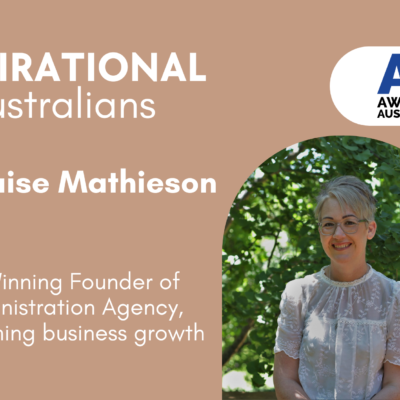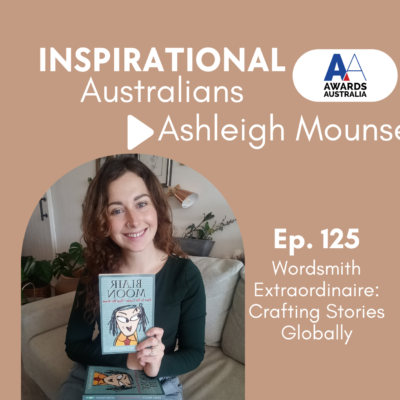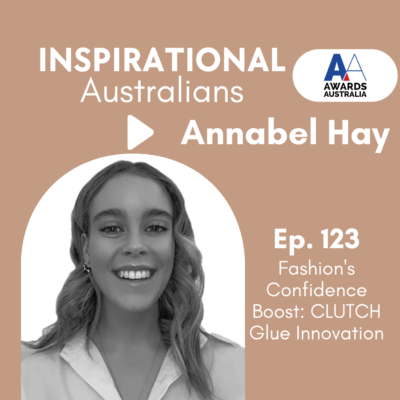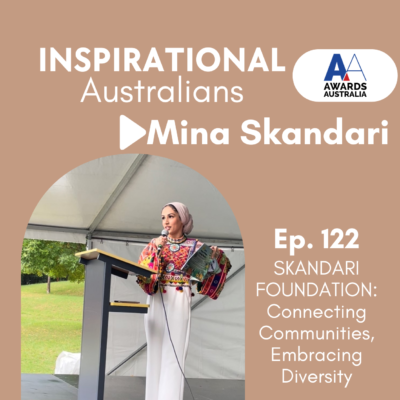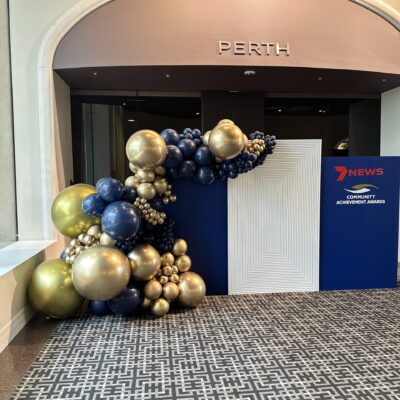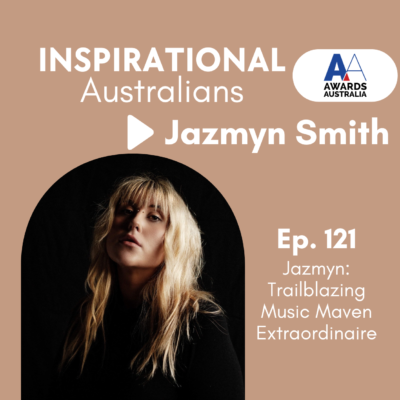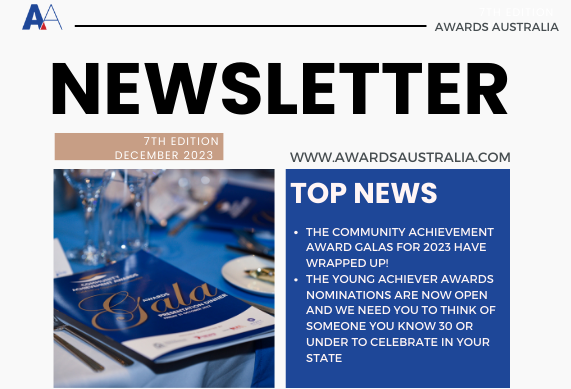In this week’s episode, Geoff is talking to Metui who was a Winner in the 2019 Northern Territory Young Achiever Awards.
Metui Tongatua is promoting the regional community through active student participation in sporting events. Metui has a double Degree in Teaching and Applied Science and is a health and physical education teacher in North-East Arnhem Land. He has secured over $300,000 worth of funding from agencies such as the Indigenous Marathon Foundation, Athletics Australia, and East-Arnhem Regional Council. Metui has also taken coaching and umpiring courses in various sports preferred by the communities he work with. Metui was adopted by Burarrwanga family from Galinwin’ku. He also maintains a strong relationship with the Yolngu people.
In this episode:
- An incredible journey of a Tongan working as a teacher in Arnhem Land.
- Be amazed at how committed Metui is to his indigenous students
- How many languages did Metui accept his Young Achiever Award? You’ll be impressed
Links
Follow us on our Inspirational.Australians Instagram Page
Want to nominate someone? (It can take as little as 2 minutes to recognise someone making a difference)
Like some more information on Corporate Partnership?
Transcript
Annette (00:05):
Welcome to the Inspirational Australians podcast, where we chat to people, making a difference in their communities and in the lives of others. And here is your host for today, Geoff Griffin.
Geoff (00:20):
Welcome to the Inspirational.Australians podcast. Can you believe we are up to episode 19 already? I apologize that the audio is not great today. Our guest has traveled from home to Darwin for some appointments and is not in the most ideal location for internet, but I know you’re really going to enjoy it anyway. Thank you.
Our podcast guest today was the 2019 Glen Corp McArthur River Mining Regional and Rural Initiative Award Winner for the Northern Territory, Young Achiever Awards. Metui Tongatua, has a double degree in teaching and applied science and as a health and physical education teacher in North-East Arnhem Land, Metui is very passionate and about bringing young people together through sports and through school. Metui, welcome to the podcast, mate.
Metui (01:23):
Thanks for having me on Geoff. It’s very much appreciated. I’m looking forward to having a chat today.
Metui (01:31):
Thank you. And I know you’re under adverse conditions there in the parents frame of, uh, the child play area. Uh, sorry. Appreciate it, man. And you know, life goes on, doesn’t it say, um, Metui, you were adopted and, uh, you do have a strong relationship with, you know, people. Can you tell us a bit about your history and how it got you to where you are today?
Metui (01:56):
I’m from North Queensland originally. Um, if you didn’t pick it from my name, I am Tongan. Um, my dad is Tongan born in and my mom’s white Australian. And so I started off in North Queensland, you know, from a fairly young age and going through school. It was a tough one for me. I, I had a lot of difficulties in school just staying local. So I would say, and so the reason I wanted to become a teacher was because I really enjoyed the whole playing sport with my friends. And so I figured a good way to, you know, maybe supplement that was to move into some sort of degree that will allow me into sport. And so what ended up happening was I ended up starting a degree at James Cook in Townsville and a teaching degree. And then one of my subjects while I was there was, um, indigenous perspectives. And so that actually flipped the switch for me. And so I decided I would up and leave North Queensland and move up to Darwin, given that the closeness relatively speaking with, you know, flights and whatnot, um, the closeness to Aboriginal communities where I was likely to want to work was, you know, the teaching up here would be more relevant for it. So I transferred up to CDU figured I could get two degrees out of what I’ve already studied with only a little bit more effort. So I, um, I did a second degree at the same time, like a double degree. I ended up meeting my wife, working out with other young people, um, but she was on her study, which I’m on now. Um, and then I met her and we went out to visit her mum who worked on still works and lives on Elcho Islands and fell in love with the place immediately, um, and fell in love in the place. Like I proposed to my wife on this trip as well, fell in love and then ended up on my final practice out there. So I was studying, you know, my last bit of university and ended up in the final practice and then being even more close with the students at the school in, in a more formal kind of professional way made me really appreciate how amazing the place is and how amazing the people are. And so what ended up happening was I decided I would, um, you know, I really wanted to come back and the prac wasn’t too long. I think it was maybe about 10 weeks. And during that 10 weeks, I, I was shown around by the family liaison officer at school. It’s probably one of my favorites stories. It’s very telling of how he is as a person. Um, the person that got to me, Peter in his role as school liaison officer, I would go out with him to visit families that have students that were in my class. And so we went to one house one day and you know, this house, the students hadn’t, you know, barely knew me cause she wasn’t going to school, which is why we’re visiting there. And the parents came out and Peter goes, Hey, this one here pointing to me, he goes, this one here, we call him baru because he’s fat like a crocodile. I was shocked, but then what actually transpired. And it took me, I think, about a day, cause I wasn’t offended, you know, because it’s more a description, not unnecessarily being mean. So baru would means crocodile in one of the languages, um, up here. And so he goes, yeah, we call him baru because he’s fat like a crocodile. Um, and it didn’t click until the next day when I’m sitting at home and I told my wife, grace, the story and she’s like, you know what that means? Right? And I’m like, Oh nah, she goes, that’s him giving you a name, like an indigenous name, telling you how you fit into the Yolngu world. I was always open for it and always willing and able to get involved in the culture. But that was a bit of a surprise to me. Like it was, it was an incredibly humbling experience and I felt a bit silly that it’s that long for me to work it out, what it actually was. He adopted me and worked it out. My wife’s adopted from Milingimbi and he had to actually call conversations about making sure that because we’re already together, he needed to adopt me. So that way I would be the right way in their culture to marry myself and my wife and our kids as subsequent kids, um, would fit into the appropriate kinship system of the culture.
Geoff (06:55):
Wow. That’s absolutely fascinating. Isn’t it? That’s, that’s awesome story.
Metui (07:00):
And I think it’s important for listeners to hear this is that I’m not actually indigenous and I don’t identify as indigenous, I’m Tongan, but while I identify as family for, you know, dodging and all the, um, you know, yolngu family, I don’t actually identify as indigenous.
Geoff (07:17):
I bet you’ve been accepted into, into their culture.
Metui (07:23):
More as a way to fit in it into their world, their world and the way that things are perceived by your own.
Geoff 07:31):
Yup. Very clearly passionate about helping people integrate into community and particularly students in terms of your teaching to be the best students they can be. Can you tell us about some of the programs that you’ve run, uh, for young people to help them integrate into school and to be involved in sport?
Metui (07:53):
Yep, for sure. So, um, in my teaching career at ELCA, I got the tap on the shoulder to move across from a re-engagement class, which I loved. Uh, my first day of class was already engagement class. I moved across from that into a middle years and then into a, um, health and PE role. The thing that I didn’t know that I was walking into was a massive event, Arnhem sports. Arnhem sports is a, I would argue one of the longest running sporting events, no one’s ever heard of. Uh it’s uh, I believe, and you know, I’m happy to be fact checked on this, but this is what I’ve been told by family and stuff that Arnhem Sports, supposed to start it back in the day when there was community education centers and, you know, mission schools at the student athletes really, really wanted to have a competition like an interschool kind of competition. And so the leaders ended up getting the heads together and going right, let’s organize this competition and they did it. And so there were, you know, hundreds of kilometers away, people traveling back then, you know, you know, transport nowadays around communities is tough back then would be even more hectic, but it just shows how much they wanted this for their communities and their schools. And so what ended up happening is, you know, is, is it goes through the schools and then the schools have taken this onboard. And so my, uh, one of my first major events was obviously our school carnival, but then a few weeks after that was Arnhem sports, which is approximately 150 people from different communities coming in, um, sleeping or awake and competing in sports all day, every day. Amazing, but tiring. And as a first year teacher, at that point, I was banging my head against the wall. It’s more, I just didn’t know the systems and the processes and whatnot, but I very much lucked out. And I will give that, give a shout out to Anna, um, and a praise at that who is a close friend of ours, who, um, actually helped me through that and picked up a lot of the Slack cause my auntie passed away mid through it. And I had to bail from community it’s, uh, she picked it up and ran with Arnhem sports while I was away. And actually, you know, her being an experienced teacher helped me a lot. Um, unfortunately it got postponed because of the cyclones we got absolutely hammered by cyclones and it was, it was a hard time, thankfully, no one, I don’t believe anyone passed away, no one passed away at least. Um, the, what happened after the cyclone over, there was so much damage that the government actually released, um, $2 million to be accessed for a community, kind of like a rebound kind of project for the community. So luckily the, the, the money that I was then able to access for Arnhem sports, like I was able to take it to another level and get, you know, a hundred grand, um, you know, work with the other schools. And what we did was we put it all together and we were able to, I was able to get, um, you know, spend about a hundred grand on, um, you know, schools, the transport I paid for everyone’s transport from the trophies, brand new sporting equipment and, um, also brand new things that could then travel around between communities, um, for alums sports to keep going. So, um, part of that hundred grand was also paid for a container. Lots of the money were also territory grants. And so I was able to access like paper different, you know, pots of money and do up like grant proposals and stuff, and then bring in interstate indigenous hip hop projects. I’m sure. I don’t know if you’ve heard of IWHP um, shout out Dionne. So IWHP came up and I brought them up, I think about three or four times, you know, the first person that I was lucky enough to bring out Elcho was actually Denzel Baker. Who’s now Baker boy. And so he was out there and, you know, he’s, his, his sister was in my class and whatnot. So like he’s got close relations relationships there. Um, but yeah, it was nice seeing an up and coming, you know, how you just look at people and go man so much talent. It’s surprising where he is nowadays. Yeah.
Geoff (12:30):
Baker boy was actually a winner of the Charles Darwin University Arts Award a few years ago. And of course couldn’t make it, it being in Queensland and had a concert on and wasn’t able to get to the event in Darwin, but they played Baker boy songs and the audio visual and the vice chancellor who was presenting the award was danced in a way on stage. It was very cool. So a bit like sport music brings people together. That’s awesome that you were able to do that. Cause that would have been amazing for everybody involved to hear.
Metui (13:09):
Really good. Yeah. I really enjoyed the opportunity to be able to, and you know, really the, like I said, the cyclone was an awful thing that smashed us, but on the other side of it, we had the community had access to $2 million in funding as a bounce back on the thing, which was nice of the government to do.
Geoff (13:29):
Yeah, absolutely brilliant. You’ve also been involved in coaching and umpiring courses. What were they for and how did they benefit what you do?
Metui (13:40):
Yep. So, um, while I was working on Elcho, I got, um, in contact with indigenous marathon foundation or indigenous marathon project. And so that’s run by Rob de Castella. He funds, or he runs a program that encourages deadly runners, you know, the deadly runners that are getting. Yeah. So all of that sort of thing. So, and what Dick’s did he ended up putting together a program, I’m not sure who was involved because I wasn’t there in the early days of it, but it ended up, he ended up wanting to come to Elcho Island, um, and setting it up. So Amanda Dent from the foundation ended up flying up and we put, um, we put together a running track on Elcho, um, integrated a, um, an indigenous sporting curriculum into, um, into my program. So you know, running specific games for specific things. And also it also allowed me to work through the health side of it as well. And not just a lot of the times you find out Bush and I’m not bagging at any teachers, but sometimes you find, um, teachers who haven’t been given opportunities to upskill themselves with, you know, how to, how to teach properly with HPE. Um, they haven’t been taught properly, so they just go outside and play sports with, uh, um, with the kids. And so, and that, um, sorry, this keeps moving. So that, that kind of frustrated me. So, um, I made sure that the PE program that we were running, which was, you know, with Indigenous Marathon Foundation was actually a PE program and not just a bit of fun time to play sport. Um, and so what that did for me was I identified that, all right, these people don’t have the skills to deliver this program properly. What can I do to help that? So what I ended up doing was I went out and, you know, because PE teachers automatically have to run the sports carnivals. And so what I ended up doing was going well, I’m okay with it. But in terms of technical, um, the technical aspects of, you know, um, track and field, for example, I don’t know a whole lot in the scheme of things. So what ended up happening was I talked to, it was through indigenous marathon foundation through them and talking to athletics, Australia that I ended up, um, uh, communicating with athletics Australia and having them send out two of their top coaches to, to Ramingining, which is where I moved after Elcho Island. I moved to Ramingining, which is another Yolngu community. And they ended up sending out two of their top coaches to upskill myself. But, um, also with that, I saw it as a good opportunity to go, Hey, here, I appreciate that, but you’re coming up anyway, let’s get all these other people in, like, you know, let’s get as many people as we can in and, you know, accredited for coaching and stuff. And so what ended up happening was not only, I kind of went a bit over the top with it, I guess, and went, Oh, well, I appreciate what doing this out of school, this heavier stuff. But while you’re here, how about we run a community coaching course for the kids at the school. And then, you know, that’s another piece of paper that the kids have. It’ll look good on a resume either way, but it’ll also give them, or it’ll give them some new skills. Um, and that way the knowledge is kept in community. And it doesn’t come in with someone like me, who, even though I do have an attachment to the community, I’m not going to be there forever. You know, unfortunately the nature of my role as a teacher is sometimes, you know, I have to move on, you know, uh, just depends on staffing and funding. So I thought it’d be a good idea to go, Hey, let’s get the skills in the community and not just, you know, haunted by the one person me who’s heavily involved in the sporting side of it, but not going to be here forever. And so I think, I can’t even remember off the top of my head. I think there were about six senior students that also ended up with Athletics Australia, accreditation, um, five adult community members, six, including myself, that ended up with level one or level two coaching for Athletics Australia. Um, and another one, I guess, you know, moving on from athletics, I’m sure we’ll touch on it later. What, what some other things that happened with athletics, but also did the same thing with basketball. So I had, um, basketball come out, um, to Ramingining beginning and run a coaching course with adults as well as student at the same time. And so we’re able to all upskill together, um, you know, put our money where our mouth, or, you know, like, you know, having some accountability about what we, as teachers say to our, to our kids, you know, do this because it’s, you know, it’ll help you learn or, you know, you’ll get better at this stuff. It’s like, yeah, that will happen. We’re going to show you as well. We’re going to do it also. Um,
Geoff (19:08):
Yeah. What a great idea to empower people through, through teaching, not just the teaching that you provide, as part of your roles, but to fairly lad in terms of giving them and just say credit that accreditation, which will help them in the future and provide local ongoing knowledge. That’s real leadership.
Metui (19:29):
Yeah. That’s been my main thing going into community. Like I’ve had it written or, you know, I’ve always made sure it’s clear that whenever I come to a community, my job is actually to put myself out of work. That’s what I see my job as is my job is to make myself redundant. And I think at the point where I can do that, that’s when real change happens, because it’s all well and good for me to keep going out there and teaching and teaching. What’s the point if I can’t get somebody local or, you know, um, you know, an indigenous person from that community, why can’t they be the teachers, et cetera? So that’s, that’s, I guess my motto is just make yourself redundant. And I think that’s important for everyone that goes out into a community where your communities in the territory, you can’t exactly as a service provider, you can’t set up and make that your home forever in Elcho, for example, because it’s not really feasible to buy a house there. Um, so it’s all publicly provided housing. So eventually it’s going to go away like, you know, the knowledge holder will eventually go away. So let’s change the knowledge, let’s upskill, local people to be able to deliver the jobs that I’m doing anyway. And so that was my biggest thing, making sure that whatever training I got, everyone’s got an opportunity to take over from what I’m doing and, you know, hopefully make some money out of it or at the very least get some fun out of it and get more skills in the community because, you know, it’s the more, the more that the community learns, the higher the baseline is.
Geoff (21:06):
Yeah. And I think that’s so important to be up-skilling people have the confidence in yourself and the power to actually provide upskilling and power for others. And I’m sure, in fact, I know that was a large part of why you won your award is because you’re a great leader and you will empower others so that they, when he was moving to another school or another community to do the same, you’ve left them with power, the knowledge and the skills. So can you think of any stories that have come to past with students or communities that you’ve worked on that really terrific stories of people who have really benefited from your work?
Metui (21:51):
Yeah, so funnily enough, my, my favorite, well, one of my favorite stories, um, you know, while teaching isn’t actually related to sport. So, um, it’s more on the health side. Um, so, well, while teaching at Ramingining, I, um, implemented a health program, you know, rather than going to the curriculum, looking at the curriculum and pulling out what the kids, what I think kids might need, or what’s mandated for the kids. I went to the community members and schooling stuff, and, you know, of course the kids, but it was, the kids have always got to have a hand in their education. Um, and what we did was we identified what things needed to be addressed in terms of health and not, I don’t want to say radical, but it was a bit of a, it was a bit of a different way to approach. It was take a problem and build a health program around it. So the problem that we faced, those mob mentality, everyone running to watch fights, for example, or running to a snake and ordering it, getting scared. And so that mob mentality was finding was actually putting people in danger. And so we worked together and put together a program that would go into what mob mentality was and how it affects them. And the way that, you know, the individualization of people is taken out when there’s a mob, you know, and the accountability. So it was more about teaching kids that no, no, you’re still you, even in a mob you’re still accountable for your actions and all those sorts of things, but also giving them the, um, you know, the, the knowledge of what them rushing to a large mob does. My favorite part of that story is that I use a few different ways to assess. I had a student who, who hadn’t been very much, he was just there, um, during a funeral, um, and during a funeral from a different community. And he came in and he didn’t really know me, but we went through our work. And then we did a, um, assessment piece at the end, which was a, you know, a questionnaire for him because he’d missed a lot of the other stuff. So I had to go through a questionnaire and every question I asked him, for example, you know, what’s the function of your heart and lungs and how they related, you know, like those sorts of things or what happens if you’re running towards the snake and encouraging other people to just, just general questions like that. And he was getting so lusted and frustrated with himself because he knew the stuff. And he was sitting there telling himself, like, what’s this in language in first language, he was telling himself the answers in first language and then going in English. Sorry, I don’t know, because he couldn’t put the words in English. I just kept going through all the questions and he’d be sitting there telling him, it’s this, this, this, but how do I say it in English? And he’s like, Oh, sorry, I’ll give up. I don’t know. And so I went to the end and I’m like, well done, mate, you’ve got a B for your health. And he’s like, I didn’t answer any questions. I’m like, he did. You just didn’t answer them in English. And he looked at me funny and there was this moment of wait, he’s understood me the whole time. Maybe I shouldn’t have sworn at him the other day. Maybe it just clicked, just I can understand what he was saying. And I was able to assess him because I could understand. I told him, cause he was still like, you know, jar on the ball kind of stuff. And I said, look, mate, what’s this test about? And he’s like, Oh, it’s about health. And I’m like, Ooh, does health have to be in English? And he’s like, no, not at all. And so it clicked finally that I’m not testing, you know, I wasn’t there testing his English. I was there testing to make sure he’s got the concept solidified in his head. And so that was an incredibly powerful moment for me. And, you know, I’m already pro bilingual. Um, but that really solidified it. So, um, I I’m lucky the, um, the first school I ever went to was a bilingual school and not running as well as it could be, but the people that were involved were making it work. And so what I saw from that was so much passion and love from the kids’ school because they were seeing that hang on. My language is my culture. And therefore my culture is being respected in the school because it’s being, the concepts are being taught in my language, you know? And that’s, that’s nice. And when I say my language, I’m paraphrasing, not actually my language, but you know, you get what I’m saying with, you know, I think the kids really, really appreciated being able to learn in first language. And, you know, in, in my case with, um, with that student was he was able to be assessed in his first link. There should be so much more bilingual funding as well as bilingual accountability, um, bilingual funding, accountability, um, in school because studies say it like any, any kind of study, and I’m happy to reference this because I’ve referenced it a few times. Um, there are a few studies, a lot of studies that say language is culture for indigenous people. You know, that that’s, that’s the connection there. Um, and if language is culture and you’re not teaching kids or embracing their first language, you’re not embracing their culture. And how can you expect kids to come in to school, learn for six hours a day and, you know, in a formal setting and how can you expect them to do that when they don’t feel respected? You know, it could be a potentially game-changing thing. Bilingual education was funded more appropriately.
Geoff (27:42):
Well, I couldn’t agree more. And I wonder, um, how difficult is it for you if you go from one community to another. And I do know that each community has different language or slightly different language. How hard is it for you to pick up on a new language when you move?
Metui (28:02):
Um, so conveniently, Ramingining and Elcho, uh have fairly similar languages, in Ramingining the main language, um, is Gupapuyngu which is a uniter language. Whereas on Elcho, the language of instruction at school was Djambarrpuyngu they’re both mutually intelligent and ha like very, very similar, um, which was lucky for me because, um, it, it made my transition in terms of language easy, but in terms of transitioning like me going over to that because of, um, like I explained before Arnhem sports and because of the, what’s it called, I think it’s called the Yolngu messenger. Everybody knew I was coming before I was even there.
Geoff (28:51):
They’re good. All great vine as well.
Metui (28:53):
Exactly. And there, there is no better great vine than the Yolngu great vine. Like they knew everything, like the people in Ramingining getting knew everything about me before I even got there.
Geoff(29:04):
Yeah, that’s funny. Metui, what motivates and drives your passion to keep making a difference.
Metui (29:09):
I’m spiteful. I hate, I hate, hate, hate seeing, and I, shouldn’t sorry, I shouldn’t use the hate word in the middle of parents’ room, but, um, I very disliked, very much dislike when kids don’t get an equal, like get given the opportunities that they deserve. You know, every kid deserves to play sport. Every kid deserves to have, you know, a variety of sports because we know in the our community, we know that staying in one sport too early, you know, is detrimental, you know, to two kids excelling in, in, you know, their future sport. So what I tried to do because natural athletes like absolute freakish athletes and community, they were very pigeonholed in what they were able to do some well, some of the kids, because they were like, I’m really good at footy. So I’m going to focus really hard on footy. So what I tried to do was let’s not focus on just one sport. Let’s actually go multiple sports and, you know, change things up a bit. And that way kids are getting better in their main sport, but through avoiding burnout and, you know, all that sort of thing, they’re able to play in different sports and then get better at their initiative. My frustration actually comes from my love of sport and a bit of frustration around me not having access to the sport as a young, younger person. Like I lived out in the middle of the Bush. And so it was a bit tough to get to, you know, trainings twice a week and, um, games on the weekends. So I just never did. And I found that tough because of where I was based that I didn’t have sport. And I’m like, well, that’s not really a good enough reason. So, you know, in the middle of Arnhem land on a remote Island, surely we can have some more different sports. And so that’s how it all started really with the passion and stuff. I just love the sport, you know, and it probably be fair to argue that it’s in my blood as well, being Tongan.
Geoff (31:15):
Yeah. And you missed out. So you wanted to make sure that others didn’t and I love that, uh, giving back, paying it forward, even though you have it yourself, you wanted to give others the opportunity. And the great thing with sport of course, is it teaches us teamwork, social cohesion, and discipline. It really makes us understand the importance of working together. Metui, changing pace for a moment. What’s something that we might not know about?
Metui (31:47):
You might not know is that I have my fourth child on the way, January 14, I’ve got a little, little boy coming. So that’ll be three boys. And one girl they’re currently out there terrorizing mummy.
Geoff (32:01):
I think our boys are hard work too. To me, I’m more active.
Metui (32:07):
My two boys are autistic as well. So, uh, both ASD. And so that presents their own challenges. It is much more difficult, but still equally fulfilling. I don’t want to say more fulfilling as a parent because obviously that’s a bit of a crappy thing to say, but I think it’s as fulfilling, you know, to parent my two ASD kids who are amazing and likely the third is she’s a bit young to be diagnosed and presents differently, but, you know, cause we know female autism is a lot different than male autism, generally speaking so.
Goeff (32:42):
Well, that’s that, um, difficulties as a parent, but rewarding when you see young people with autism grow and develop it lucky you are a teacher, teaching takes a lot of teaching and training and working with the children and patience. Um, I do speak firsthand as well with firsthand knowledge, but, uh, it’s one thing, the development that you can help with all power to you and to your wife with number four coming that’s brilliant. Metui do you think becoming a winner in the Young Achiever Awards helped your work with young people or your credibility at all?
Metui (33:24):
I find it incredibly hard taking compliments and that obviously it’s a massive compliment, so I haven’t reflected on it because I find it so difficult taking compliments and I think it could be a cultural thing or just the way I was raised. What it did do, it allowed me to use my voice while I was there to say the things that I’m not sure if you remember my speech, but I was able to, this is part of my passion. I delivered my speech, which was meant to be one minute, um, turned it into six minutes because I delivered it in three different languages because I wanted everybody to hear what I was saying. And I can’t honestly stand up there and say, listen, you need to hear me if I’m not giving it to people in their own language. Obviously I couldn’t do every language there, but the languages that I could speak. So I delivered it in, um, accident in Djambarrpuyngu, which is, um, yeah, not my plan language. Cause I, my adopted father hasn’t taught me so much. I’m looking at you, um, which is a different language and the other, you know, and it’s, this is one of my other highlights from it. What actually came from me getting nominated. And you know, me winning was the next year. There were three people from Ramingining getting nominated, um, which is this year. And one of them is a finalist Jack Bumbler, who is a really god friend of mine. Um, and we worked together at Ramingining getting an amazing guy, absolutely phenomenal. And I think everybody deserves to win, but I don’t know the other guys, so I can’t speak for them, but Jack, I can’t speak highly enough of him is a phenomenal human being and a hard worker and his heart, his heart is for the community.
Geoff (35:10):
Well, there’s a couple of things straight away that I can see as a result of you winning the award and who could forget, uh, how inspiring that delivery was, that in itself provided an opportunity for you to say how important it is for everybody to be heard. I’ll also check being a finalist in itself was just fantastic. So great outcome. Would you encourage now? I know you don’t like to be acknowledged, but it is really nice to get that pat on the back most we don’t go out of the way and we get embarrassed. It is really nice for someone to say, you know what? I think you’re doing great job. So that in itself is, is really awesome. Would you encourage people to nominate other people to nominate young people for the awards?
Metui (36:03):
Yeah, for sure. So, um, the awesome thing that’s coming about it is other people are getting nominated. Yes. But what I’m doing is whenever I’m seeing like a Facebook ad or something, um, I’m, you know, for nominate this person, I’m actually getting in there and nominating people now because of, you know, as much as I say, I didn’t like the compliment. It felt good to be acknowledged for the work that I thought my most recent nomination, I’m not, I need to follow up with that. Cause I, I I’ve been a bit off the air in terms of emails and whatnot, um, was outlook psychology, um, in Muhlenberg as, as a small business award. And I believe there were one of the psychologists that worked there who was one of my colleagues also, um, was nominated for younger achiever this year around she was a semifinalist. Um, Hey Tamika, how are you? Um, and so, yeah, she was really good. And I will say, like to go on a bit of a more serious, um, no, the reason I was able to nominate them is because, and I think it’s not talked enough about, especially as males, um, Polynesian males in particular that, um, that sometimes, and sorry if this is kind of getting a bit off track, but I think it’s important. Um, cause I, I like my kids to hear it and I, and I would hope that other people would one day kids to hear that, you know, sometimes crap happens in life and you need to access, you know, you know, for example, I access outlook psychology after my previous role because it was such a full on role. Um, following on from their awards, I was promoted. I was head hunted into a senior teacher role over in Ramingining. So I ran that program with a bunch of students who are disempowered and disenfranchised by the system. So indigenous students mostly. And so the role that I was put in because of, I guess, you know, the stuff that I’d done previously with engagement, as well as, you know, language, it was a tough role and it took a toll because you know, there’s a lot of needling in, in that space. And so what ended up happening to me was I ended up being diagnosed with anxiety, um, after that sort of stuff then, so what happened was I, I sought out some help, you know, which it’s okay to say you’re not okay. Absolutely, and I encourage, you know, anyone listening to please don’t put it off. Like I put it off for ages and I was in a much worse what I knew I have. Um, I knew I would have been better sooner had I gotten out in front of it a bit more. And so, um, I’m currently managing that, which is why I’m on study, leave now, or part of the reason why I’m on study leave because I needed that time to get my head right after I guess, burning the candle at both ends for so long. But I will also point out that I highly doubt that I’m doing much more than any other teacher, um, because you know, teachers absolutely work their bottom off and, and I guess they don’t really get acknowledged for it. No ma’am and you know, part of my speech was saying that I’m being acknowledged for what I’ve done, but what I do is what all the other teachers also do. If you want to put a bit of effort in, it’ll go a long way. And I think most of the teachers especially are pushed in remote on the territory are, you know, they’re working incredibly hard and you know, particularly this year where some teachers haven’t left commmunity all year, I, and, and I guess that’s a bit of my imposter syndrome is I feel bad a little bit for winning the award. When I know there are so many other people doing the same amount, if not more than me,
Geoff (39:58):
I think, well, winning your award, what it does. It also adds value to every teacher who is making a difference and working like you working so hard to make a difference in a community. It actually adds value. You should never feel like an impostor because you’re doing extraordinary work, but it does say match for all teachers, the value. And that’s why Glencore Ribbon Mining. And also of course the NT government support the thoughts. And there was an government Young Indigenous Educator Award as well. So never feel like an imposter or that you feel bad because you won an award over someone else because you are extraordinary. What you’re doing is making such a difference in your communities in part, because what you’re doing is providing the skills for people to continue on in your place when you leave. And that is such a valuable tool. What do you think the world needs more of right now?
Metui (41:07):
Mask and common sense? No. Um, what the world needs more of is an appreciation and empathy and appreciation of other people, not just appreciation of the people close to you, but appreciation of what other people around you have done and are doing. Um, because there are so many people doing so many things, but I think it’s important that people take a moment to appreciate what other people do, you know, not just for them, but for other people. And, you know, even people doing stuff for themselves, sometimes that’s what people need. And so I think if we could have a bit more appreciation around well, perfect world, it would go a long way. Um, and you know, showing a bit of empathy, I’m seeing like the terror in the territory, especially there’s so much hate towards, um, young black kids. You just have to stop and have a moment of empathy and say so much funding has been cut from youth services and youth programs, and then the crime rate goes up. So I’m just saying like, you know, maybe look at the obvious, have a bit of appreciation, but have a bit of empathy that when you were a kid and when, you know, when I was a kid, we had more programs, there was a little bit more funding around. We were able to do different things, but as the funding keeps decreasing and decreasing and decreasing in, in youth services and, and, you know, um, intervention type programs, I’m not sure if you’re a hundred percent of kids in detention in the territory are black. It’s just something that’s bugging me this morning, but it has bugged me for a long time, which is why I bring it up now that everyone just needs a little bit more appreciation, like I said, but also a little bit more empathy, um, you know, have a heart. These are kids, you know, there are, ten-year-olds locked up
Geoff (42:56):
What their circumstances are, their backgrounds, how tough I’ve done it, you know, and they need our help. Uh, not our criticism. Absolutely. Right. Particularly all young people, uh, just living their investigating life and doing things. And we don’t, we really need to be empathetic as you say. And I think you’re right. That is something that the world’s missing is understanding and empathy and appreciating that if someone is, even if it’s just having a bad day, we don’t know why. And don’t judge someone on what you see. So you’re spot on an absolutely right. And then we need to do so much more to make a difference in the broader community, particularly for young people, which just know what your focus is. So we’ll power to, for that. Hey, Metui what’s um, when you finish the study, leave, what’s next for you? What do you, what do you, think’s on the cards view?
Metui (43:50):
So we are currently sitting on, I’m going to take leave and be stay at home dad, um, which I just adore. Absolutely all because, um, which surprises a lot of people. I mean, you look at me, I’m a, I’m a massive Island do with a scruffy face and who looks mean and, you know, um, and so I like challenging that narrative around big scruffy dudes and they’re loving little children like that. That’s what I love doing. And so my wife and I have talked, and so we’ve decided I’ll go under study leave, but we’re currently trying to work out where are we going to be for next year? Um, she has an application for us to stay we’re currently based in Maningrida. So she wants to, we both want to stay there, but we’ll see how that goes. We’ll find out in the next week or so. Um, if not, then it’s back to the farm or a little bit while the kids are young and maybe do relief teaching. And I’ve been offered a few jobs over in Queensland in the indigenous space, but I think I need to rebuild my mental wellbeing before I can head back in and work with, you know, likely trauma kids. Cause I’ll, I’ll, I’ll likely stay in the indigenous space. And statistically speaking, we know that there’s a lot of trauma in indigenous families and systemic, um, through to, you know, intergenerational stuff. So I don’t think I’m as useful as I can be to, as an ally to work in the field just yet, because well, not necessarily working, but dedicating as much as I want to dedicate, I know I can do it. It wouldn’t be a big toll.
Geoff (45:33):
It takes a lot out of you, doesn’t it? Yeah. Well, I had the good fortune other while ago to work with a lady by the name of Nicole Brown, who is the deputy chair of the Larrakia Nation Aboriginal corporation. And she is such a beautiful soul and Larrakia woman herself. It was a joy to, to work with her. And I, I don’t understand what you’re saying. So, um, well power to you for the work you do be strong. It takes a long time to change attitudes. Um, you know, people’s perceptions and in there keep working. Cause what you’re doing is actually making a difference where it counts with young people get, uh, get strong and uh, I’m sure looking after your kids is it’s vitally important. Well, no doubt vital important as well. And I just want to make a point. I don’t think anybody would think that you’re scary. No one could imagine you being scary with that smile. Hey, you’re not going to fall anybody. Sorry. We’re way, way, way over time. But your, um, your story is really fascinating and inspiring to everybody, all teachers, to all indigenous people and non-indigenous people alike who, of which there are many, the one to make a difference. So how can people connect with you if they would like to do that? What’s the best way to connect with you.
Metui (47:03):
I can give my details to you after this. And I’m happy if this, it circulates with the podcast because honestly I’m happy for anyone to reach out and pick my brain. That was my thing. Growing up, especially as an early teacher, my thing was, I’m not going to come in and reinvent the wheel. There’s got to be something that’s worked in the past. Let’s find that let’s use that. And so a lot of my stuff was picking people’s brains and Oh, that makes sense. And a lot of trial and error, um, and you know, staying up to date on best practice. So I’m happy if people want to reach out, um, I’ll give my email address and other contact details if anybody wants or needs. And I’m happy if, um, you know, listeners want to get in contact and have a chat, even if it’s a general chat of what’s the community, like all the way through to what the hell is ends at mass. So visible learning, you know, the more in depth stuff that you find in schools.
Geoff (48:00):
Well, Metui it’s been such a great pleasure to chat with you today. I know you’re out here in adversity there in the kids’ play area and down way of traveling six hours from home. I appreciate that you have, you’ve taken the time and mate space away from everybody, all the noise that it’s playing. Right?
Metui (48:21):
It’s a beautiful! Hello, and that’s my, he’s my middle child and he’s my other one. And I have a little girl Laci. There she is. Sorry, my little girl. And then there’s number four.
Geoff (49:02):
Mate, It’s been such a pleasure to chat with today to hear your story. Yeah. Inspiring. You’re doing an amazing job. I’m so pleased that you were nominated, even though you were embarrassed about it because you do inspire people. And part of the value of you winning an award is giving opportunity to young people, but also paying it forward with nominations and people like Jack, who was subsequently being nominated and probably wouldn’t if it wasn’t for you and your story. So thanks so much for coming on the podcast. We really appreciate hearing from you and opening up to your story has been a real privilege. Well until next week, take care of, be kind and be the difference for someone in need. I hope you enjoyed today’s interview as much as I have. We would love you to subscribe to our podcast so that you won’t miss an episode. Join us each week, as we talk with ordinary Australians achieving extraordinary things. Did you know that Awards Australia is a family owned business that proudly makes a difference in the lives of those that make a difference for others. And we thank our corporate and not for profit partners for making our awards programs possible. Do you know someone that’s making a difference or maybe your business might like to sponsor an award, contact us through our Instagram page, inspirational.australians or head to our website awardsaustralia.com. It would be great if you could share this episode with your network because who doesn’t like a good news story and please rate and review us. We would really love to hear your thoughts until next week, stay safe and remember, together we make a difference.
Annette (50:50):
Thanks for joining us today on the inspirational Australians podcast, we hope you enjoyed listening and have been inspired by ordinary Australians, achieving extraordinary things. So it’s goodbye for another week. Remember, together we make a difference.



